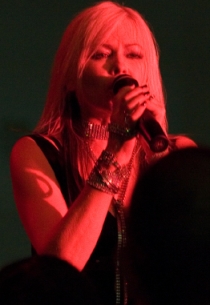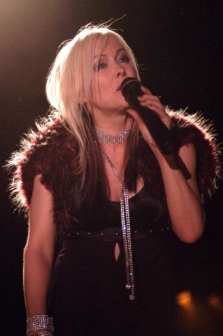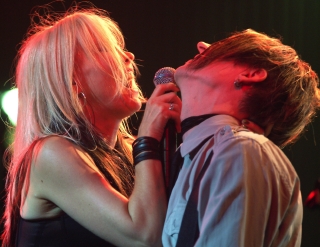

Beyond The Metro: An Interview with Terri Nunn of Berlin
Gail Worley
For fans of ’80s electronic music – and the far-reaching wave of style and pop culture that followed in its wake – Berlin vocalist Terri Nunn is an icon. As the charismatic vocal and focal point for a band that virtually launched electronic dance rock in the US, Terri earned the No. 11 spot on VH1’s list of the “100 Greatest Women in Rock.” It might come as a surprise then to hear that Terri (who has inarguably inspired legions of modern female rockers) was first inspired by male role models like Robert Plant and David Bowie. “The first artists that changed my brain about what I wanted to do were men,” Terri confesses. “On stage they were really loud, powerful, sexy and irreverent. The guys seemed to have a lot more fun than any of the girls I saw.” But Terri’s perception shifted when she discovered the artistry of three very distinct women in rock: Grace Slick, Anne Wilson and Stevie Nicks. “Grace Slick was really like a guy on stage, and she showed me the role I wanted in a rock band,” Terri explains. “Anne Wilson also had an incredible vocal power and presence, because she was very influenced by Robert Plant. Then I discovered Stevie Nicks, who was femininity and mystery in the midst of the rock world, and I wanted that, too. As an artist and singer, I modeled my life after those three women.”
Still performing and recording more than 20 years after the release of Berlin’s groundbreaking debut, Pleasure Victim, Terri and Berlin are currently touring in support of 4 Play, the group’s most recent release. An eclectic and ambitious album, 4 Play is comprised of new material along with both classic and modern alternative rock covers from a first rate selection of artists – David Bowie, Depeche Mode and industrial-Goth icon Marilyn Manson, to name a few. With a mix of both studio and live recordings, 4 Play is everything you’d expect from Berlin, a band that continues to explore and perfect a sound they pioneered over two decades ago. Ink 19 recently spoke with Terri Nunn about her long and fascinating career. In a completely hilarious and candid interview, Terri spilled the beans about reuniting with her original Berlin cohorts John Crawford and David Diamond for VH1’s Bands Reunited, waxed nostalgic on the significant role music has played in her life and dished the dirt on what the recording session for the infamous hit single “Sex” was really like.
Back in the early ’80s, when keyboard-driven, synth rock was first happening Berlin was at the vanguard of everything. What do you remember about the band’s early days and what it was like to make it in the LA scene?
We didn’t realize at the time that [our music] was the start of what we now call electronic music. Berlin’s early sound has moved into so many different genres and morphed into industrial, trance and even electroclash. Bands like Interpol, Fisher Spooner and GoldFrapp are actually direct descendents of what we were doing. We were first inspired to create our sound from a couple of European bands – Ultravox and Kraftwerk – that were using these new kinds of keyboards that created very different sounds than those of a standard keyboard or piano. It created a whole new dynamic that we fell in love with and we just thought, ‘Wow, that’s just amazing.’
We figured that since those bands had male singers, if we had a female singer, we might have something that was different and unique even if it wasn’t as good. But because it wasn’t really happening here yet, it was hard. We were laughed at and people didn’t get it. At the time we came out, the exciting music that was being signed was by bands such as the Knack, The Plimsouls, The GoGos and The Motels. It was all skinny ties and a lot of upbeat, happy guitar stuff. The record labels just didn’t understand what we were doing. Luckily we believed in ourselves, kept going and got better as songwriters.
Finally (laughs) it got to a point where a tiny record label called Enigma – which was just starting out – took a chance on us. Their first two signings were Berlin and Motley Crue, but they took off really fast. Geffen had been our first label choice, but they turned us down right away when we asked the major labels for help. Then they came back to us when we sold 25,000 copies of Pleasure Victim in a month. Geffen bought the album from Enigma and re-released it on their label in the beginning of 1983.
Then we started touring and we just took off. I would say that in the beginning the most important song for us was our first single, “The Metro.” Every record is an exploration for a band and there is usually one song that will stand out and make you say, ‘That’s it! That’s what this album is going to be about.’ We thought there was something about that song that mattered and that we could create an entire record around the song. Pleasure Victim was actually not intended to be released as an EP; it was supposed to be a bunch of demos to get us a record deal. We created the record, including the cover, for Enigma for under $3,000 and it went multi-platinum in America. That was probably the best return ever (laughs). It was a good start. And the most amazing thing about “The Metro” is that even today it’s probably one of the most important songs in our catalog. It stands up to the test of time and it’s still played on radio stations everywhere I go. It’s just one of those songs that defined us and defined that period of music, for people.
I see the video on VH1 Classic all the time. Today I actually saw the video for “Dancing In Berlin,” which is one of my favorite songs of yours. But I feel like I grew up with Berlin because I was a college radio DJ when your first EP came out. Also I remember the song “Sex” was unbelievably controversial. Do you want to say anything about that?
“Sex” was one song we hadn’t yet written when we decided to make an EP ourselves and put Pleasure Victim together. We have a station out here called KROQ – or “K-ROCK” – and K-ROCK made it possible for bands like us to be heard at all, because no radio station was touching our kind of music and we had a lot of trouble getting played. It just didn’t fit anything that was going on at the time. K-ROCK was happening and we were huge fans of the station because they were playing everything different. I was so lucky to be in LA and to hear this music and be inspired by it to start a band like Berlin and to even have a chance. So I was listening to that station all of the time, as was John. We thought, ‘What could we write that they would definitely play?’ They loved dance and controversial stuff or songs that had very in-your-face messages.
They used to play that song “Teenage Enema Nurses in Bondage.”
Oh yeah! And “People Who Died” by Jim Carroll and “88 Lines About 44 Women” and Romeo Void – all that stuff was getting played. One day we were sitting in the studio while we were mixing and John was messing around on a riff. He started singing that Muddy Waters song “Mannish Boy.” You know, the lyrics go “I’m a man…” And I started throwing in lines here and there like “Woman,” “Bitch,” “Rock Star,” “Diva”…I was just throwing lines around. John said, ‘You know, there’s something here, why don’t you take this home and see what you come up with?’ I based the song’s lyrics around something in my life at the time. The guy I was dating, we had been together a while and we were having some problems in bed, because it was just getting boring. I was trying to get him into some role-playing and at one point he said (laughs), ‘You know Terri, I’m not a pirate, or a burglar. I don’t really want to be a rapist that comes and gets you and ties you down. I really don’t want to be any of those things: I’m just a guy. I’m a man. I like normal guy things and that’s all I really want to do.’
I took that line, “I’m a man” – which was really a slap in the face for me – and made that the chorus, the man thing; “I’m a man, I’m a man.” But, to me, that’s really boring, so I was dancing around him in the chorus “I’m this, I’m that! I’m having a great time and you’re just a man!” That was the whole point of the song, for me. John ran with it and we put it down in one day. I went into the studio and sang it with John, then I took it home to my mother and I said, ‘Mom, what do you think?’ She listened to it and she said, ‘You know, Terri, if you’re going to sing a song like this you’re really going to have to be 110 percent on this. This is not 110 percent. You guys don’t sound into it at all. You’re going to have to go back and do it again and really do it. I’ve gotta hear that you want his guy.’
“Produced by My Mom!”
Right! I said, ‘Well, I don’t want John.’ She said, ‘Imagine he’s whoever you like – Johnny Depp or whoever you’re into. Just make it work…or don’t do it. Because it’s not working right now.’
(Laughs) I went into the studio and I had this herbal book with a section on aphrodisiacs. It said that if you drink apricot brandy you get really horny. I grabbed a bottle of apricot brandy, dragged it down to the studio and started drinking (laughs). I got into the studio with John and I am looped! Oh my god, I was having the best time. It was the first and last time I have ever sung [while] high – on anything. The only reason that I’m not one of those burnout rock stars that just crashes and burns is because my body can’t take it. I’m a wimp. I can’t drink more than one glass of anything [without being] completely incoherent. There is no drug that I can get onstage with and make any sense at all, so that’s never been my direction. But that song, he was laughing and…we had the best time. We finished he song and I stumbled out into the control room where the producer was and I said, (sounding drunk) ‘How was it?’ And he said, ‘it was really good!’ And then I passed out! (Laughs uproariously) so it worked and the song got the seal of approval from my mother. I mean, I had to do something. John and I were partners for thirteen years and we did all of the videos together like we were lovers…but, no. He was never my thing.

Another really important song in the band’s career was “Take My Breath Away,” which sort of launched you into the ionosphere. It won the Golden Globe and Academy awards in addition to selling millions of records and crossing over. Do you want speak about how that success changed things for the band?
With that song, our popularity exploded worldwide for the first time. We were pretty much situated here and we had very limited success in other countries besides America. There was a little bit of success in Australia, and New Zealand actually gave us out first Gold record…but in New Zealand a Gold record is like selling five copies. Then when “Take My Breath Away” came out it was everywhere. It was number one around the world, so for the first time we had a shot at playing everywhere. That was huge for us, but the sad thing is that we were falling apart while we were having this breakthrough success. We didn’t even want to look at each other anymore. It was bittersweet. We did a world tour with Frankie Goes to Hollywood that took us to Europe and England in a huge stadium tour. It was amazing for us because we’d never done anything that big before. Then right after that we broke up. That was in 1987.
You left Berlin in 1987 to go solo but didn’t release your first solo CD until 1992. What went on in the meantime?
I went through a lot of searching and I worked with other people a lot on their stuff. I worked with Perry Farrell on a movie of his called The Gift. I worked with Andrew Eldrich from the Sisters of Mercy on a song for his “Best Of” album, I worked with a jazz artist, Dan Siegel on one of his records. It really felt like [I was] getting out of a cage for the first time, because I’d been working with John or doing Berlin since 1979. Finally, it felt like I could finally do anything I wanted. I had money, so I just enjoyed collaborating with other people on different things for a while. Then I finally settled on a couple of partners to make a record for me, which was called Moment of Truth. I wrote most of the material with Karl Hyde from a band called Underworld. It finally came together; we recorded it in 1991 and it came out in ‘92.
How is Moment of Truth different from what you did with Berlin?
It’s completely different. It was all over the map; too much so, actually. It was a mess. I just tried to do twenty different styles of songs (laughs) on one record: rap, dance, pop, ballads, rock, it was just everything. The problem was that it just wasn’t unique. I was trying to be too many different things. It had some good moments but it just didn’t hold together as an album. It would do better if it were released now because people don’t buy albums anymore. They just download singles.
When did you decide to put Berlin back together?
In 1998 I put band a together and went out on the road to play Berlin’s songs. We hadn’t written anything new yet but then we put out two EPS, Fall Into Heaven 1 and Fall Into Heaven 2 – which were 4 or 5 song EPs. Then we did the live album, Sacred and Profane in 2000 and the first full studio album, Voyeur in 2002. The line up has stayed mainly the same with Mitchell Sigman on keyboards – who’s also my co-writer and producer – and Chris Olivas on drums. They both came into the band in 2000.
How do you think Voyeur showed the band’s creative growth?
It has the same keyboard-based sound and it’s as electronic as ever, it’s just more contemporary. We incorporated a lot of inspiration from bands like Garbage and Sneaker Pimps, and even industrial [artists] like Nine Inch Nails, but there is a lot of new technology, new sounds and new directions. I really thought that what I can add to the mix of today’s electronic music is a message in the lyrics I write. To me, messages are really important in music. Bands have changed my life, not just for the sound but also for what they’ve said to me.
In my younger years I didn’t have a lot of stability. We were a family that moved a lot so my records were my friends. I listened to them and their messages about love, war, friendship, loss and pain, all that. I learned a lot about life, people and myself. That’s what I wanted to keep in the music and that’s what I felt was missing from a lot of [contemporary music]. Trent Reznor has some great messages in his music.
Following that, you were voted #11 in VH1’s list of the “100 Greatest Women in Rock.” What are your feelings on that?
That was pretty shocking. They called me after it was done to tell me [I’d made the list]. That was really cool. But, you know it’s so transient, it’s something that depends on what day or what year in your life they call you. Who knows what it will be in ten years, or even tomorrow? I don’t know, it changes all the time. I really appreciate it though, that people thought that I made a difference enough to put me on that list.
What was it like filming VH1 Bands Reunited show (filmed in 2004 and aired in 2005) after not seeing David or John in so long?
I was already touring as Berlin with my new band, but VH1 wanted the original members from the first album. I had a sense that this music was still vital because we’d been going out and playing for five years prior to this show. I realized then how much of an impact we’d had, because the audience was still there and growing. I didn’t know if John was going to agree to come on the show because we hadn’t talked in seven years. He’s been out of music for a long time as well. He has a business called Mad Science and he’s married with three kids.
A version of “No More Words” from the Bands Reunited show is included on 4 Play. What would you like to say about that?
I love having that on the record because it’s the last song [John and David and I] recorded together and the version is so good. I licensed it from VH1 so I could put it on the record, which was lucky. We only had four days to rehearse for that show and doing that song was a last minute idea of David Diamond’s. He sad, ‘you know, we’ve never done that song acoustic and I think it would sound pretty good.’ We sat down with a couple of guitars and banged through it and wow, it was amazing. Everyone at the show said that was the best song we did that night. I’m really happy to have it on 4 Play.

Who is in the band now?
On guitar we have Carlton Bost (ex-Deadsy) who is wonderful, Chris Olivas (Professional Murder Music) on drums and Mitchell Sigman on keyboards. I originally met Mitchell because I had done some demos with Steven Siebold of Hate Dept in 1997 that never went anywhere. Mitchell had worked with Steven so he recommended him to me because I needed some new players and he thought Mitchell was a genius. Coming from Steven, who hates everybody, that was saying a lot.
There are a number of covers on the CD. How did you choose the material you wanted to record?
Except for one song, these are songs we’ve played live over the years. They’re songs that we’ve chosen to do for fun, from artists that we love. I’ve wanted to make this record for a long time but every record label shut me down because they don’t make as much money from a band doing other people’s songs as they do if the band does original songs. This is the first time I could both afford to do it myself and I didn’t care, I didn’t have a record label saying no. I finally got to record the songs that we’ve been doing all of these years into one compilation.
Why did you choose to include Buffalo Springfield’s protest song, “For What It’s Worth”?
I’m really happy that song made the record because it doesn’t include any of the players I’m currently working with. That was recorded for the _Best of Berlin_album in 1987 and we never put it on the record. We ended up putting another song in its place. “For What It’s Worth” was recorded with producer David Kirschenbaum (Tracy Chapman) and some players we just put together.
It’s nice to bring that song out, because so many people don’t know it and Stephen Stills is such a great songwriter. Plus as a protest song it’s still so timely.
For me, the whole 9/11 thing was a huge wake up call for America. We are a really young country in relation to the rest of the world and we’ve been really naive and gullible with our borders and our security. We trust maybe a little bit too much and that [even] was a call that we need to grow up. We need to be more protective of ourselves as a country. The lyric “There’s something happening here” really spoke to me. Stephen Stills really called it.
Since you’re in LA, do you listen to (Ex-Sex Pistol guitarist) Steve Jones’ radio show?
I love that guy! He’s had us on a couple of times. I’ve been involved with a band called Camp Freddy, so I’ve played with him as well. Camp Freddy is a band made up of superstars; Dave Navarro and Chris Chaney from Jane’s Addiction are two of the guys, along with Matt Sorum and Billy Morrison from The Cult. They’re the core band and then they invite all of their friends down, so Steve is one of them, Billy Duffy, Scott Weiland, Courtney Love, Steven Tyler, me, Jerry Cantrell and other people – we all go down and play with them, usually for benefits, and we just do whatever the fuck we want. It’s so amazing. I’ve been able to play on a couple of Sex Pistols songs with Steve Jones and I’ve been able to sing with him. I got to sing “Man in The Box” with Jerry Cantrell, singing Layne Staley’s part, which was amazing. So Steve is keeping it alive.
Thinking of yourself as somewhat of an ’80s icon and a fairly powerful role model for women in rock, how do you think Berlin impacted the music scene and what would you say were your significant contributions to the sound of popular music at that time?
We were at the very beginning of electronic movement in America. That’s something I’m proud of, because at the time we didn’t know if it was something that would last. It could have been just a fad. To me, it was so exciting because, with electronic music you could make any sound you wanted. It took rock ‘n’ roll to a new level, beyond just bass, drums, guitar and vocals. Now the exciting thing for me is that it can be anything I want it to be live. Back in the day we struggled to try and make something similar to the record live, because the live technology hadn’t caught up with the [available] studio gadgetry. Now we have computers running on stage and we have video content running with the computers simultaneously with the music. It’s fantastic! (Laughs) It keeps me excited about music because the possibilities of electronic music are endless. I love guitars, but it’s been done. I’ve heard enough guitar solos for the rest of my life to never hear them again. With electronic music …you can’t say it’s even started yet. I’m proud to say that’s something we stuck our necks out [for] and believed in, kept at and made our mark with. It wasn’t easy, but it was something that did last.












